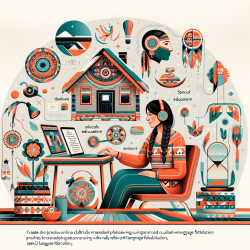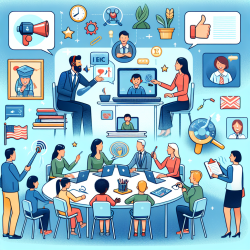In the realm of speech-language pathology, understanding cultural nuances can significantly enhance the effectiveness of therapeutic interventions. The study titled "Using Culturally Appropriate Methodology to Explore Dene Mothers Views on Language Facilitation" by Luella Bernacki Jonk and Charlotte Enns provides invaluable insights into how cultural context influences language acquisition among children. This blog will delve into the key findings of the research and offer practical advice for practitioners looking to improve their skills through culturally responsive methods.
Understanding Cultural Differences
The research aimed to identify differences in beliefs and educational practices related to language acquisition between Dene and non-Aboriginal mothers. Thirty Dene mothers from a Northern community and thirty non-Aboriginal mothers completed surveys that were culturally adjusted for the Dene culture and language. The study revealed subtle but significant differences between the two groups in terms of their beliefs and practices.
Key Findings
- Spirituality and Connection to Tradition: Dene mothers valued spirituality and their child's connection to traditional faith and beliefs more highly than non-Aboriginal mothers.
- Child-Directed Speech: Dene mothers supported the use of child-directed speech to facilitate their children's language development.
- Role of Elders and Grandparents: Elders and grandparents were seen as having an important role in the children's lives, providing advice and support.
- Combination of Verbal and Hands-On Instruction: Dene mothers favored teaching by providing a combination of verbal and hands-on instruction.
Practical Applications for Practitioners
For speech-language pathologists and educators working with Aboriginal children, incorporating these culturally responsive strategies can make a significant difference. Here are some practical steps:
- Integrate Spirituality: Recognize the importance of spirituality and traditional beliefs in the child's life. Incorporate these elements into therapy sessions when appropriate.
- Use Child-Directed Speech: Engage in child-directed speech, which is a natural and effective way to support language development.
- Involve Elders and Grandparents: Encourage the involvement of Elders and grandparents in the child's learning process. Their wisdom and experience can provide valuable support.
- Combine Verbal and Hands-On Instruction: Use a mix of verbal explanations and hands-on activities to teach new concepts, making the learning process more engaging and effective.
Encouraging Further Research
While this study provides valuable insights, it also highlights the need for further research in this area. Practitioners are encouraged to conduct their own studies or collaborate with researchers to explore the impact of culturally responsive methodologies on language acquisition among different cultural groups.
To read the original research paper, please follow this link: Using Culturally Appropriate Methodology to Explore Dene Mothers Views on Language Facilitation.










